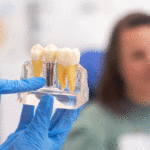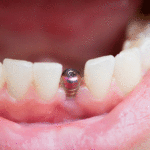Are you thinking about saying goodbye to your traditional dentures and making the switch to dental implants? You have much to look forward to! Of course, you might have questions about what to expect as you transition from dentures to a different from of tooth replacement. In this blog post, you will learn about what may happen during your journey to a stronger, more functional, and more confident smile.
Getting Dental Implants
Getting dental implants may require that you undergo one or more complex procedures. For example, if your jawbone is thin or weak, you might need a bone graft. Either at the same time as your graft or a few months afterward, you will need to have your implants placed in your jawbone. Some patients also require other treatments, such as gum disease therapy, before they can move forward.
The idea of undergoing oral surgery might seem a little intimidating, but you can be sure that your dental team will handle your case as conservatively and gently as possible.
Getting Your New Teeth
It may take several months for your dental implants to firmly bond with your jawbone (this happens during a biological process known as osseointegration). Throughout that time, you might have a temporary set of teeth, so you will be able to smile with confidence and enjoy a wide variety of soft foods.
Once adequate osseointegration has occurred, your dental team will design your permanent new teeth, which will be tailored to fit your unique mouth and colored to complement your facial features. In rare cases, a patient’s existing denture can be secured onto their dental implants. However, most people need an entirely new prosthetic.
Adjusting to Your Prosthetic
When you first got your traditional denture, you may recall that it took a while for you to adjust to it. You had to learn special techniques for eating, and it might have been challenging to speak clearly at first. Fortunately, implant dentures are different.
Because implant dentures are firmly secured in the mouth, they do not slide or slip like their traditional counterparts. They are also extremely sturdy, so they can be used to eat virtually any food, including those that you were unable to enjoy with your traditional dentures.
Of course, when you first get your implant dentures, they might feel strange, and it is normal to experience some soreness in the gums. However, most patients adapt fairly quickly.
Transitioning from dentures to dental implants takes some time and planning. However, any inconveniences you experience along the way will be well worth it when your stronger, sturdier smile is in place!
Meet the Practice
Under the direction of Dr. Hanife Canan Bayraktaroglu (Dr. Bay), Smile Rehab Centers provides a range of dental implant treatments, including overdentures, All-on-4, and more. If you are struggling with the disadvantages of a traditional denture, we invite you to come in for a free consultation. In the meantime, you can contact us at 737-250-0304 to learn more about what we do and how we may be able to serve you.





